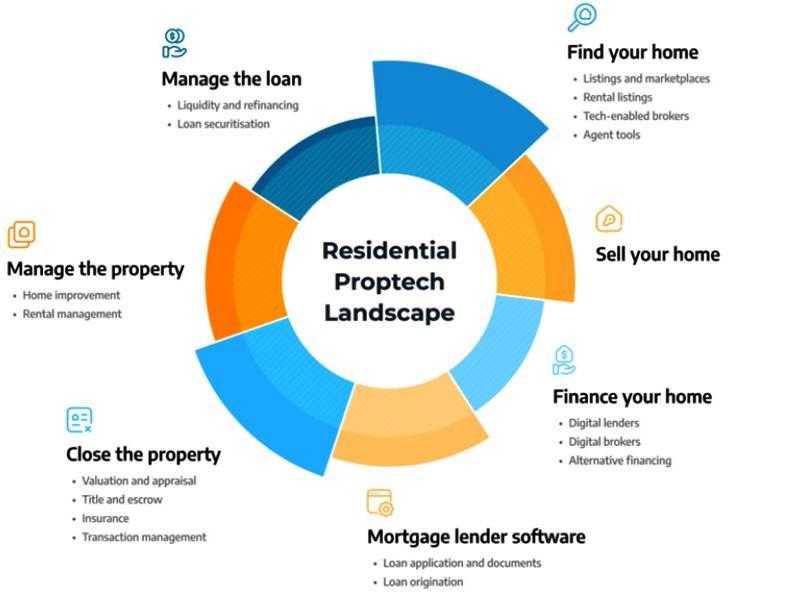The real estate industry has seen a dramatic transformation in recent years thanks to the rising tide of technological innovation. From virtual reality to smart homes, technology has revolutionised the way properties are marketed, sold, and managed.
Real estate agents have a lot on their plate, from administration and marketing to negotiating and researching. To tackle these tasks, many agents work in teams or larger companies with different individuals handling various roles.
Many industry professionals believe there is still a lot of unnecessary work slowing down the process. Property management, in particular, is seen as inefficient and lacking transparency.
The primary role of real estate agents is to build and maintain relationships with buyers, sellers, and tenants. Any technology that can free up agents’ time to focus on this task will ultimately streamline the real estate market.
But even beyond the agents, there are issues with tedious and slow transactions that are difficult to track and contain sensitive information.
To address these problems, significant investments have been made in new technology and transaction models in recent years. However, it remains to be seen which ones will truly deliver on their promises of streamlining processes and shaking up the antiquated roots of the market.
Virtual and augmented reality.
One of the most significant trends driving this transformation is the rise of virtual and augmented reality. With the ability to create 3D models of properties, virtual tours, and immersive experiences, buyers can now get a feel for a property without ever setting foot inside.
AR has opened up a whole new world of opportunities for buyers, sellers, and agents alike, allowing for a more seamless and efficient sales process.
Smart home technology
Smart home technology has also played a significant role in the industry’s transformation. With the advent of smart home systems and devices, homeowners can now control their homes’ various features and functions from anywhere in the world. This has not only increased the convenience and comfort of living but also boosted property values as buyers look for homes that offer the latest in smart home technology.
85% of buyers say they would pay more for a home that had smart home technology installed, and 68% said they would be more likely to buy a home that had smart home features.
Internet of Things (IoT) devices
IoT devices provide a cost-effective solution for businesses, renters, and homeowners to enhance efficiency, lower expenses, and boost productivity.
What are IoT devices? They are smart devices, including sensors, gadgets, and appliances that wirelessly connect to technology to communicate with each other and with us. They gather, transmit, and sometimes act on received data.
IoT devices allow users to make informed decisions regarding various aspects such as property valuations, energy efficiency, automated building, and security. As per Intel, the global IoT market is projected to reach $6.2 trillion by 2025.
Data analytics and artificial intelligence.
The real estate industry has also seen the benefits of data analytics and artificial intelligence. With the ability to analyse vast amounts of data on properties, buyers, and trends, real estate agents can now tailor their marketing and sales strategies to meet the specific needs of their clients. This has led to more personalised and effective marketing campaigns, resulting in increased sales and customer satisfaction.
Possibilities that lie ahead
As we move further into the digital age, the real estate industry is poised to benefit even more from the latest technological advancements. The adoption of blockchain technology to streamline the property transfer process and the use of drones for aerial property inspections are just two examples of the many possibilities that lie ahead.
Turning to technology to help find a dream home
In a rapidly changing world, homeowners are increasingly turning to technology to help them find their dream homes. As more and more buyers look towards online listings, virtual tours, and smart home technology, the real estate industry is experiencing a revolution.
In Australia, this trend has been particularly evident, with statistics showing a significant increase in the use of technology when buying a home.
According to a recent report by the Real Estate Institute of Australia, 92% of Australian homebuyers now use online property listings as their primary source of information when searching for a new home. This is a significant increase from just a few years ago when the majority of buyers relied on traditional methods such as print advertisements and open houses.
Virtual tours have also become increasingly popular, with 87% of buyers stating that they would be willing to purchase a property without ever stepping foot inside if a virtual tour was available. This has opened up a whole new world of opportunities for buyers and sellers alike, allowing for a more seamless and efficient sales process.
The benefits of technology in the real estate industry
The benefits of technology in the real estate industry are clear. With the ability to search for properties from the comfort of their own homes, buyers can save time and money. Virtual tours and smart home technology also offer convenience and added value to properties, making them more appealing to buyers.
However, there are concerns that this increasing reliance on technology could lead to a loss of personal connection between buyers and agents. While technology can certainly make the sales process more efficient, there is still a need for human interaction and personal relationships in the industry.
Technology reshaping the way Australians invest in property
As the property industry in Australia continues to rapidly evolve with the advent of technological advancements, investors can now manage their own portfolios with ease. However, the question remains whether the human element is still essential to act as a liaison between landlords and tenants.
The integration of consumer apps and industry tools has become a fundamental component of the property industry, enhancing lead generation, client management, and off-site work processes. The market is now flooded with platforms that aim to disrupt traditional methods of viewing, buying, selling, or managing properties.
According to Kylie Davis, the Founder and President of the Proptech Association Australia, the industry has seen an explosion of start-ups over the past three years, with more than 600 proptech businesses now present in Australia. As such, the industry is continuously growing and transforming to cater to the ever-increasing demand.
While technology has streamlined several processes, the importance of human interaction and personalized services cannot be underestimated.
In managing properties, there are still essential aspects that require a human touch, such as conflict resolution, building relationships with tenants and landlords, and providing emotional support during challenging times.
Therefore, while proptech innovations have undoubtedly enhanced the property industry, the human element remains an essential part of the process.
As the industry continues to evolve, it will be interesting to see how technology and human interaction can be integrated to provide the best possible experience for investors, landlords, and tenants alike.
Proptech & Investors
Although savvy investors have embraced proptech, the real estate industry has been a late adopter of technology.
According to Adam Empringham, Director of Sales for Image Property in Brisbane, proptech has brought more transparency to sales data and price negotiations, allowing investors to self-manage their portfolios.
While technology has made it easier to go directly to the market, the shift from agencies to self-management has not yet had a significant impact on market share, as negotiations and dispute resolution still require a mediator.
4Many investors find the responsibility and effort required to manage properties themselves to be too burdensome, making agency fees worth the cost. Despite this, investors looking to cut out the middle man are still abundant, and proptech has made it easier than ever before.
According to Kylie Davis, the Founder and President of the Proptech Association Australia, proptech platforms like Instarent, Different, and Yabonza have gained popularity, giving landlords all the tools of a project management system, and managing property centrally.
The benefits of using proptech as a landlord include having one point of contact and centralised records, enabling property managers to have a complete overview of the landlord’s portfolio.

The uptake of proptech
The uptake of proptech – property technology – is on the rise in Australia as people increasingly use it for everything from finding and financing to managing their homes.
A recent investment platform raising of $1.6 million is just one example of the impact proptech is having on the real estate industry and changing consumer behavior in the property sector.
Proptech encompasses software and services that allow people to engage with other businesses, customers, and industry professionals digitally.
The benefits of proptech are numerous, from capturing real-time data to reducing costs, increasing efficiency, and enabling better investment decisions.
Although the real estate industry has been slow to embrace digital technology, the pandemic has accelerated the adoption of proptech, with industry players recognizing its value.
According to Kylie Davis, the founder and president of the Proptech Association Australia, the disruption is being driven by buyers and investors who seek more transparency, better service, and time-saving measures, resulting in a major change in how real estate is being transacted.
The Australian PropTech industry
In recent years, the Australian PropTech industry has been gaining momentum steadily. Although not as extensive or advanced as its counterparts in the UK or US, it is keeping pace in terms of new PropTech startups and investment. Currently, there are over 381 PropTech companies operating across Australia.
How real estate can drive data leadership in 2023
Yardi’s Senior Regional Director for Asia Pacific, Bernie Devine, with over three decades of industry experience, predicts an “inflection point” in 2023 for real estate companies.
With 30+ years’ experience dedicated to real estate and technology, Bernie is a leader in digital transformation in real estate and using data to create a more competitive and collaborative environment.
According to Yardi’s research, 60% of real estate companies in the Asia Pacific region were investing in business process automation in 2022, and 58% were planning to adopt big data analytics within three years.
However, more than a quarter of real estate companies in the Asia Pacific still use spreadsheets for budgeting and projections, while a third of companies rely on them for accounting and property management.
Yardi’s latest whitepaper highlights five opportunities for all Asia Pacific real estate companies to improve their data organisation and optimisation.
One such area of focus for 2023 is data protection, as high-profile corporate data breaches in 2022 have sharpened the consumer focus on data protection, and tougher penalties are ahead.
Another opportunity is to establish a ‘single source of truth’ across the enterprise by eliminating spreadsheets, which are not designed to handle large amounts of data and can lead to errors and data security issues.
Yardi anticipates that real estate companies will continue to streamline their business processes, embrace automation, and improve their compliance in 2023.
Yardi has data for clients with US$6 trillion of assets under management and a global footprint with products used in 80 countries. A select slice of Yardi’s customer base in Asia Pacific and Europe was taken to compare and contrast the regions
How Do Real Estate Professionals Use Proptech Software?
Proptech software serves various needs for professionals in different roles and organisations. Building operators can leverage it to monitor occupancy or lighting, while investment managers can gain real-time insight into their deal pipelines.
Here are some of the ways that both businesses and individuals are using proptech:
- Listing Services: Sourcing and managing new deals, from new home rehab projects to multi-million dollar commercial investments
- Tenant Experience: Delivering a stronger tenant experience with digitally connected homes and buildings and smart building technology
- Real Estate Marketplaces: Connecting buyers and sellers, landlords and tenants, and investment managers and investors via online marketplaces to expedite transactions, including virtual property touring software
- Building Operations: Optimizing operations by saving time and money through new efficiencies and streamlined processes
- Deal Management: Aligning companies by providing visibility into upcoming deals, tasks, data, communications and much more, especially on the institutional side
- Data Aggregation: Accessing third-party market data to set a baseline for future decisions
- Real Estate Data Analytics: Gleaning insights from and centralizing data-driven analytics, including simplified reporting
- Property Management: Responding to and tracking maintenance requests in a more organized and timely manner
Top 10 Most Used Real Estate Software in Australia
As the Australian property market continues to surge, real estate agents need to stay competitive by utilising cutting-edge technologies and tools. Luckily, there are numerous software programs available that can assist agents in streamlining their workflow and increasing efficiency.
1. Campaigntrack
Many real estate agents use Campaigntrack to enhance their property campaigns. This innovative tool is tailored for hassle-free property marketing management, allowing agents to efficiently handle both complex operations and simple product orders. With Campaigntrack, agents can optimise their efforts and take advantage of potential opportunities.
2. Realestate.com.au
Realestate.com.au is the leading destination in Australia for discovering your dream home and staying informed on the latest property news and real estate market data.
Designed to simplify the entire process and reduce stress, this software empowers Australians at every stage of their property journey, whether they are just beginning their search or long-term investors exploring new areas. It is a comprehensive source where people with shared interests in Australian property opportunities can come together.
3. Realtair
Realtair is an Australian real estate software that provides an end-to-end workflow for customizing proposals, signing digital contracts, and running listing campaigns. This software empowers agents to accomplish more with less, serving as an all-in-one tool that includes proposal builders and auction platforms, with all listings conveniently tracked on a single dashboard.
4. CoreLogic
As the premier provider of property data, analytics, and services in Australia and New Zealand, CoreLogic offers essential insights for making informed real estate decisions across multiple industries.
Their independent organisation boasts an impressive track record of delivering accurate information backed by decades of experience. CoreLogic serves a diverse range of sectors, including banking and finance, government, construction, and insurance.
5. CampaignAgent
CampaignAgent is the foremost provider of Pay Now and Pay Later solutions for vendor-paid advertising. This platform empowers homeowners, principals, agents, landlords, and tenants to pursue their ideal lifestyles by removing financial barriers that may impede their success.
With innovative funding solutions and top-tier technology partners delivering best-in-class results, CampaignAgent paves the way for users to achieve their goals.
6. VaultRE
VaultRE is the premier solution for leveraging powerful technology to fuel your real estate business. This unique and fully integrated cloud and app-based system, designed specifically for the industry, offers an all-encompassing sales and property management platform.
With innovative features that recognize different statuses of both properties and contacts, VaultRE provides tailored solutions across teams, making it easier than ever before to manage your business.
7. Agent Box
Agentbox is the most widely adopted real estate software in Australia due to its powerful efficiency, extensive integration with other applications, and industry-leading data management solution that ensures clean data.
This cloud-based solution offers Sales and Property Management teams a comprehensive platform, expertly crafted through cutting-edge design and unparalleled real estate market knowledge. Top industry professionals have praised this winning combination, empowering them to perform at their best.
8. Realhub
Realhub is an all-in-one marketing platform that can help your Real Estate agency achieve extraordinary success. With its comprehensive, accurate, and efficient tools, Realhub empowers professional agents to perform at their best with ease.
From digital and print services across Australia to a single unified hub for all campaigns and staff members, Realhub offers a fast-acting and user-friendly solution to maximize your potential.
9. LockedOn
LockedOn is the ultimate real estate software that caters to agencies of all sizes, delivering automated CRM and marketing capabilities to its users.
With its comprehensive features such as client management, property lifecycle tracking, trust accounting tools, and OFI check-ins, this powerful platform provides an end-to-end solution that seamlessly incorporates every aspect of your agency workflow.
10. Printforce
With decades of experience in the industry, Printforce is the premier provider of customised printing and marketing solutions for real estate in Australia.
Their national network allows for swift delivery to any corner of the country, thanks to their in-house production capability. With robust infrastructure support, you can rely on Printforce to consistently deliver high-quality products straight to your doorstep.
New models in real estate – iBuying
iBuying is a relatively new idea that offers an alternative to traditional real estate sales through agents. With iBuying, sellers can sell their properties to well-funded startups at a moment’s notice, without even showcasing the property.
Companies like OpenDoor and OfferPad provide an offer in just a few minutes, based on their own valuation models. The process can take a few days, making it an attractive option for those seeking a quick sale.
While these companies claim to offer a good customer experience and competitive prices, they are essentially investors looking to make a profit.
As a result, the commission rate can be high, and there may be a premium charge for the fast liquidation of the property. Moreover, iBuying is not available everywhere, as buying and selling properties en masse requires significant start-up capital.
In the US, however, iBuying has gained popularity, accounting for 4% of the market share in Florida alone. OpenDoor, for instance, recently secured a $400 million investment from Japanese multinational Softbank, and other iBuyer companies are receiving promising financing.
It remains to be seen how much disruption iBuying will make to the traditional real estate selling model, but it is unlikely to disappear anytime soon.
Real estate technology – shared investing & shared ownership
The real estate technology industry is currently focusing on two avenues: shared investing and shared ownership. Sharing the cost of a property is a great solution to tackle affordability issues and also provides investors with an opportunity to invest in real estate.
The brick-by-brick investing model is a new way of treating property as an investment similar to the stock market. Brick X is one of the companies promoting this model, which involves dividing properties into 10,000 pieces. Investors can purchase as many “bricks” as they want, and earn net rentals in proportion to the bricks they own, while also earning capital gains when bricks are sold.
Kohab is another company that is exploring the shared ownership model. Its platform makes it easier for people to co-own property by providing tools and knowledge for collaboration among investors and agents, as well as offering a legal framework to draw up a final contract to begin a shared investment.
Technology supporting agents
The battle for the real estate market is fierce, with iBuying and fixed-fee models vying for the top spot. But for those who seek the best results, the traditional agent route is still the way to go. Yet, in a market filled with uncertainty and secrecy, the need for transparency, information and resources is more crucial than ever.
That’s where OpenAgent comes in. Born out of the desire to revolutionize Australia’s property market, it offers a transparent service that connects home sellers with the right agent for their needs.
With a dedicated team analysing millions of sales and tens of thousands of customer reviews, OpenAgent provides a personalized service that matches vendors with top-performing local agents.
But this is not just about sellers finding the right agent. OpenAgent’s ultimate goal is to create a common forum where everybody benefits. Buyers and sellers have access to a free online database and dedicated consultant support, while agents receive continued business, online promotion, and rewards for providing exceptional customer service.
While technology has undoubtedly changed the property industry, the role of human interaction and personalised services remains essential.
As the industry continues to evolve, a balance between technology and human interaction will be necessary to provide the best possible experience for investors, landlords, and tenants.
As buyers become more tech-savvy, the industry must adapt to meet their changing needs. While there are certainly challenges ahead, the benefits of embracing technology are clear, and the industry is poised for a bright future







